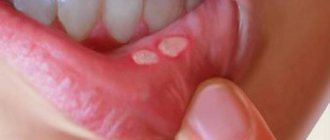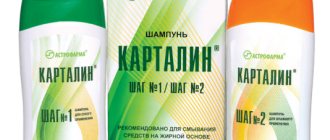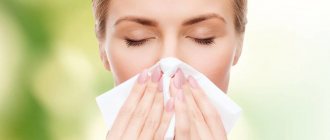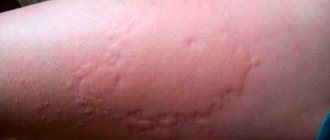Many people know that citrus fruits can cause a severe allergic reaction. Lemon, which is considered a very healthy fruit, is no exception. An allergy to lemon develops quite rarely. Most often, the disease occurs in children and patients suffering from serious diseases of the digestive system. This can be in the form of dysbacteriosis, dyskinesia, hepatitis, etc. It should be noted that lemon contains vitamin C, which allows this fruit to be used as a remedy for colds.
Causes
Can you be allergic to lemon? An atypical reaction of the body to this fruit is quite likely, since it is highly allergenic. The reasons for this reaction of the body are:
Intolerance by the body to the protein contained in lemon and acts as an allergen. The immune system identifies this substance as a foreign object and rejects it, which outwardly manifests itself in allergic reactions. In this case, they speak of a true allergy. A person suffers not only after consuming lemon, but also when using food, medicines and cosmetics that contain acids, oil or extract of this fruit.
- Irritating effects of chemicals used on citrus fruits. Lemons are treated with substances that allow the fruit to be stored for a long time, as well as maintain its presentable appearance, and with compounds that protect citrus fruits from rotting and mold. In this case, the allergic reaction is not the result of the body's intolerance to the fruit itself.
- Presence of gastrointestinal diseases. In this case, the allergy is called false. The risk of developing allergic reactions when consuming lemon increases with dysbacteriosis and hepatitis of various origins.
- Heredity. In approximately 50% of cases, allergy sufferers suffer from intolerance to citrus fruits in a hereditary form. Moreover, the risk of an allergy to lemon is present even if immediate relatives suffered from another form of food allergy (for example, chocolate intolerance).
Sometimes allergy manifestations occur as an isolated incident if a person has eaten too many citrus fruits. The specific proteins contained in lemon, which enter the body in large quantities, stimulate the activation of the immune system, which begins to produce antibodies against the allergen.
The most pronounced allergy to lemon is observed in children, which is associated with the incomplete formation of their immunity.
E330 – Citric acid
The fact is that now citric acid is not made from lemons. The main production method is biosynthesis from sucrose using strains of mold fungi of the genus Aspergillus. If there is an allergic reaction, it will obviously not be to citrus fruits. You can relieve the symptoms of an allergic reaction. It is possible to relieve angioedema, get rid of hives or a runny nose, but it is impossible to cure allergies. After stopping an attack of an allergic reaction, it may happen again in the future upon contact with an allergen.
Manifestations
An allergy to citric acid, the symptoms of which appear quite clearly, occurs quickly - after about 2-3 hours. The severity of manifestations largely depends on the amount of citrus fruits eaten, the state of the immune system, and hereditary predisposition to food allergies.
Localized symptoms of a lemon allergy include the following:
- severe headache;
- frequent and loose stools;
- abdominal pain;
- redness and severe itching of the skin, the formation of a rash on them. Skin manifestations are especially pronounced on the face and hands;
- attacks of nausea and vomiting;
- nasal congestion and runny nose;
- redness of the eyes;
- sore throat;
- burning sensation in the mouth;
- swelling of the oral mucosa;
- dysfunction of the respiratory system (attacks of suffocation, asthma).
Generalized manifestations of allergy to citrus fruits are anaphylactic shock, in which severe respiratory disturbances occur, blood pressure drops sharply and generalized urticaria is observed, as well as Quincke's edema.
Positive properties
In the food industry, E 330 is used due to its properties to influence products:
This substance also has a positive effect on the human body. The main effect of citric acid is its inclusion in the Krebs tricarboxylic acid cycle, which provides energy to every cell of the body, so a certain amount is vital for the normal functioning of all systems.
Positive effects on the body of the food additive E 330:
Citric acid is also used in cosmetology. Using it in this form helps fight acne, wrinkles, and restores the youthful color of the skin of the face and body.
Treatment options
When a lemon allergy occurs, symptoms in adults require immediate professional help. Therapy in this case requires an integrated approach.
Drug treatment
For attacks of an allergic reaction, the following medications are prescribed:
- Antihistamines (Suprastin, Zodak), which help suppress the activity of allergens.
- Sorbents (Smecta, activated carbon). These medications help remove toxins from the body and improve the functioning of the gastrointestinal tract.
- Local agents to eliminate skin manifestations (Hydrocortisone, Lokoid).
If necessary, the doctor prescribes immunotherapy. This event involves introducing a small amount of allergen into the body, which is gradually increased. This activates the body’s production of antibodies to the allergen.
Traditional methods
If lemon causes an allergic reaction that is not pronounced, then you can use traditional medicine. The most effective are:
- Decoction of calendula flowers. To prepare it, you need to take 10 g of raw material and pour a glass of hot water. The liquid should sit for 2-3 hours. You need to consume it one tablespoon, three times a day.
- Infusion of yarrow. You need to prepare it like this: take a glass of boiling water for 30 g of dry raw material, pour it in, let it brew for 30 minutes, then strain. Take the resulting product before meals, a quarter glass.
- Nettle based decoction. You need to take a tablespoon of nettle flowers and pour 250 ml of boiling water. Place in a warm place for half an hour. Strain and take half a glass several times a day.
Diet features
If you are allergic to citrus fruits, it is important to follow a special diet. It is necessary to exclude products that are also significant allergens. This:
- honey;
- milk;
- chocolate;
- mushrooms;
- nuts;
- shrimps.
You should consume foods that have a low degree of allergenicity. These are zucchini, pumpkin, broccoli, turkey meat.
Possible cross-reactions
If a person is allergic to sour lemon juice and zest, then one should expect similar body reactions to tangerines, grapefruits and oranges. In addition, you need to avoid orange and red foods, including carrots and tomatoes. Banana and quince can also provoke negative reactions in the body.
The peculiarity of cross-allergy is a gradual increase in the number of allergens and, accordingly, a slow increase in negative reactions.
How to choose and eat lemons
All that remains is to choose it correctly. If you want to choose fruits with the highest content of nutrients, look for unripe fruits, with a shiny, oily surface and smooth skin. The fruits should be heavy. This lemon will be juicy and have few seeds. Let only fruits of sunny yellow color fall into your basket. Avoid thick-skinned fruits (as a rule, these are two-year-old fruits and the content of nutrients in them is much lower than in young ones). You should not buy soft, wilted or shriveled fruits; there is a high probability of bringing home rotten or overripe fruits. Examine them thoroughly from all sides; there should be no mold on them, and the peel around the stalk should be a rich, bright color (if the fruit is spoiled, this is where the color will discolor).
Some good tips for consuming lemon:
Frozen lemon can be added to various dishes
- excess bitterness will go away if the fruit is placed in the freezer for half an hour;
- grate frozen lemon - get an excellent addition to salads, sauces, creams;
- lemon zest is rich in potassium, calcium, vitamin C, essential oils - use it as a seasoning;
- if you feel sick in transport, you should put a slice of lemon under your tongue;
- if your nails turn yellow after polishing, just soak them in lemon juice;
- honey and juice of half a lemon mixed in equal proportions - an excellent lightening mask;
- dried lemon peel will remove unpleasant odors from shoes, just put it inside;
- if you suffer from gout, add a clove of garlic to a teaspoon of lemon juice, orally 2 times a day;
- To remove grease from surfaces, simply rub them with lemon.
Good luck with your choice and enjoy!
Features of an allergy to lemons in a child
The reaction to lemon in children is especially severe. At the age of 7-8 years, allergies to citrus fruits are common. In these cases, children may experience symptoms either a few hours after eating the fruit or a day later.
A special feature of childhood allergies is diathesis (bright red spots on the chin and cheeks).
The baby may also suffer from a special reaction to citrus fruits, the proteins of which enter the body along with mother's milk. In this case, he looks sick, loses his appetite, and his skin becomes covered with bright red spots.
Children of any age at the first symptoms of allergy must be taken to a medical facility, since this condition is especially difficult for them.
Composition of lemon and effect on the body
What exactly vitamins and minerals do we get by cutting off a slice of fragrant lemon? What are these sunny fruits rich in? It is the composition of citrus that determines the benefits, and in some cases can cause harm. In it you will find: monosaccharides, disaccharides, organic acids (citric, malic), pectin, ash and dietary fiber; vitamins: group B, A, PP, E, C; minerals: Mo, Fe, F, Mg, Cu, K, Mn, Zn, B, S, Ca, P. The seeds contain fatty oil and a bitter substance - limonin. The characteristic pleasant smell of citrus is given by the essential oil contained in the peel.
Due to their composition, the fruits of the lemon tree have an excellent effect on a number of human systems and organs:
- potassium in combination with iron has a beneficial effect on the functioning of the heart, maintains normal blood pressure, promotes the smooth functioning of the nervous system, brain systems, and is necessary for the walls of blood vessels;
- calcium affects the functioning of the endocrine glands, the formation of strong bone tissue, teeth, and in combination with magnesium, changes the composition of the blood, making it thinner, cleaner (breaks down cholesterol plaques);
- vitamin C is necessary to strengthen blood vessels, provide the body with energy, remove free radicals, and can also slow down the aging process and strengthen the immune system;
- used in cosmetology to return the skin to its natural color, whiten freckles, rejuvenate, prevent wrinkles, remove age spots, and strengthen hair;
- good for teeth and gums: if you wipe your teeth with the peel, the roots will become stronger and the color of the enamel will improve;
- Grated lemon peel improves performance, speeds up the absorption of information, it makes sense to place grated lemon peel near your workplace.
For some painful conditions, these wonderful fruits will help painlessly cope with unpleasant symptoms:
Lemon has many beneficial properties
- leg cramps will subside if you apply freshly squeezed juice to your feet, the procedure is carried out in the morning and evening, the application time is two weeks;
- various fungal infections recede, just wipe them with lemon;
- the peel effectively copes with calluses;
- patients with gout are advised to juice to break down uric acid;
- for constipation, it is recommended to drink a glass of warm water, squeezing a spoonful of sour fruit juice into it, as soon as you wake up;
- when suffering from various inflammations of the gums and periodontal disease, rinsing with water and lemon is prescribed;
- a sore throat at the initial stage or a cold will subside after gargling with water and citrus juice;
- effective for fever: having a diaphoretic effect, it reduces high fever;
- It is not easy to overestimate the effect that the use of golden citrus essential oil gives for acne, freckles, sunburn and other undesirable phenomena on the skin.
Recommendations for consuming citrus fruits
To prevent the development of an allergic reaction, the following recommendations should be followed:
- Avoid this fruit during pregnancy, especially if you have high blood pressure.
- Lemon can be introduced into a child’s diet no earlier than the age of 3 years. Before doing this, you should consult your pediatrician.
- Lemon should not be consumed by those who suffer from allergies to citrus fruits, as well as from diseases of the gastrointestinal tract and kidneys.
- Before eating citrus fruits, you should rinse them thoroughly with hot water to remove any chemicals that may have been used on the peel.
Allergy to lemon is a common condition that occurs in the presence of certain characteristics of the body. This phenomenon requires treatment, since in severe cases the allergy can cause death.
Diagnostics
Skin tests
Symptoms manifest differently for most people. If the allergic reaction is severe, the symptoms that appear can be life-threatening.
In severe cases of allergy to citrus fruits, Quincke's edema, angioedema, and anaphylactic shock develop. If help is not provided to the patient in time, such a complication can result in death.
Before starting therapeutic treatment, a diagnosis must be made. First you need to go to an allergist. The doctor collects anamnesis, examines the skin and prescribes laboratory tests.
The detection of immunoglobulins E in the blood indicates the presence of an allergen in the body.
To identify the cause of allergies, you should take a blood test for antigen and various tests for allergens.
During an allergy test, small scratches are made on the patient's arm, and then a drop of the allergen is dropped. After this, wait for the reaction to appear for 20 minutes.
Preventive measures
To minimize the risk of development it is necessary:
- Reduce consumption of lemon and products containing it while pregnant. Women with high blood pressure should be especially careful. Large consumption of citrus can lead to uterine hypertonicity and the development of an allergic reaction in the fetus.
- Avoid introducing lemon into the diet of children under 3 years of age. Afterwards, its use should be carried out under the supervision of parents.
- People with allergies to citrus fruits, high acidity and kidney failure should remove lemon from their diet.
- You should avoid citrus fruits if you have oral diseases.
Allergen f208 – lemon, IgE (ImmunoCAP)
[21-651] Allergen f208 – lemon, IgE (ImmunoCAP)
970 rub.
Quantitative determination in the blood of specific antibodies, class E immunoglobulins, that appear in the presence of an allergic reaction to lemon.
Synonyms Russian
Specific immunoglobulin class E for lemon.
English synonyms
Specific immunoglobulin E to the lemon, Spec. IgE to the lemon (serum).
Research method
Solid phase immunofluorescence (ImmunoCAP).
Units
kUA/l (kilounit of allergen per liter).
What biomaterial can be used for research?
Venous or capillary blood.
How to properly prepare for research?
- Do not smoke for 30 minutes before the test.
General information about the study
An allergen is a substance that causes an allergic reaction. There are a huge number of substances of natural or artificial origin, each of which can become an allergen for humans.
Allergens differ among themselves in solubility, enzymatic and temperature stability. Food allergens can be of animal or plant origin.
Their peculiarity is the ability to change allergenic properties during cooking. At the same time, some food products lose their allergenicity, while others become dangerous to humans.
Sometimes heat treatment results in the loss of the original protein structure, but immunoglobulins E can still react with the destroyed food proteins.
The main participant in an immediate allergic reaction (type 1) is immunoglobulin E (IgE). For each allergen there is a specific immunoglobulin E. The purpose of this test is to determine an allergic reaction to lemon.
Lemon contains a large amount of organic acids, pectin substances, sugars, carotene, phytoncides, B vitamins, vitamin C, rutin, flavonoids, coumarin derivatives, galacturonic acid, sesquiterpenes, hesperidin, eriocitrin, eridictyol.
For therapeutic and prophylactic purposes, lemons are used for hypovitaminosis, avitaminosis, diseases of the gastrointestinal tract, mineral metabolism disorders, rheumatism, urolithiasis, atherosclerosis, scurvy, sore throat, gout, hypertension. Lemon juice and lemon oil obtained from fresh peels are used to improve the taste and smell of medicines.
Allergies to citrus fruits occur equally often in both children and adults. If you experience an allergic reaction after eating lemon, you are wary of citric acid, but it is only a specific protein or substance in the lemon that causes symptoms.
An allergy to lemon is usually accompanied by dysfunction of the digestive system (cheilitis, gastritis, colitis, gastroenteritis, irritable bowel syndrome), skin manifestations (atopic dermatitis, urticaria, Quincke's edema) and, less commonly, dysfunction of the respiratory system (allergic rhinitis, bronchial asthma ).
Performing this study is safe for the patient compared to skin tests (in vivo), since it eliminates the patient’s contact with the allergen. Taking antihistamines and age characteristics do not affect the quality and accuracy of the study.
The use of tests for the quantitative determination of specific IgE antibodies allows us to assess the relationship between the level of antibodies and the clinical manifestations of allergies. Low values of this indicator indicate a low probability of allergic disease, while a high level has a high correlation with the clinical manifestations of the disease.
By detecting high levels of specific IgE, it is possible to predict the development of allergies in the future and a more pronounced manifestation of allergy symptoms. However, the level of IgE in the blood is not stable. It changes with the development of the disease, with the amount of allergen dose received, as well as during treatment.
It is recommended to repeat the study if symptoms change and treatment is monitored. Consult your doctor about the need for re-examination.
ImmunoCAP is characterized by high accuracy and specificity, which is achieved by detecting low concentrations of IgE antibodies in a very small amount of patient blood. The study is revolutionary and is based on the immunofluorescent method, which allows it to increase sensitivity several times compared to other tests.
WHO and the World Allergy Organization recognize diagnosis using ImmunoCAP as the “gold standard”, as this technique has proven its accuracy and consistency of results in independent studies.
In the Russian Federation, until now it has not become widespread, although throughout the world up to 80% of determinations of specific class E immunoglobulins are performed using ImmunoCAP.
Thus, identifying specific IgE using this technique takes allergy diagnostics to a qualitatively new level.
What is the research used for?
- For the diagnosis of allergic diseases (food allergies, atopic dermatitis, bronchial asthma, allergic rhinitis, respiratory allergosis).
- To assess the risk of developing allergic reactions to lemon.
When is the study scheduled?
- If you have the following symptoms indicating an allergic nature when eating lemons and products in which they were used: redness and itching of the skin, angioedema, rhinoconjunctivitis, laryngeal edema, cough and bronchospasm, nausea, vomiting, abdominal pain and diarrhea, etc.
- Continuously relapsing disease without periods of remission.
- It is impossible to discontinue medications to treat the underlying disease, as they may affect the results of skin testing.
- For children – when their parents suffer from allergic diseases.
- Children under 5 years of age (if skin tests are not possible).
- In case of damage to the skin, during the acute period of the disease.
- The polyvalent nature of sensitization, when it is not possible to conduct in vivo testing with suspected allergens.
- False positive or false negative skin test result.
What do the results mean?
Reference values
| Indicator value, kUA/l | Class | IgE antibodies |
| 0 – 0,35 | 0 | Absent |
| 0,351 – 0,69 | 1 | Short |
| 0,70 – 3,49 | 2 | Average |
| 3,5 – 17,49 | 3 | High |
| 17,5 – 49,99 | 4 | Very tall |
| 50,0 – 100,0 | 5 | Intensely high |
| More than 100.0 | 6 | Extremely high |
Reasons for increased levels of specific IgE:
- presence of allergic reactions to lemon;
- atopic dermatitis, food allergies caused by sensitization to lemon allergens.
Reasons for decreased levels of specific IgE
With repeated research (over time), the level of specific IgE may decrease for the following reasons:
- limiting or eliminating contact with the allergen;
- carrying out drug treatment.
Cross reactions
- Cross reactions are allergic reactions to components of the same structure present in different allergens. To avoid unnecessary tests that are unnecessary for the patient and to individually select possible cross-reacting allergens, consultation with an allergist is necessary.
Source: https://helix.ru/kb/item/21-651
Allergy symptoms
The symptoms are similar to those of other types of allergies. Eye redness, watery eyes, and sneezing occur. Rarely, anaphylactic shock is possible, often leading to death.
Skin manifestations
Signs of an undesirable reaction are redness of the skin, itching, and the appearance of rashes on the skin. Possible urticaria and eczema.
Pathologies of the digestive system
Abdominal pain, stool disorders (diarrhea, flatulence), nausea occur. Repeated vomiting is possible.
Respiratory system damage
Characterized by nasal congestion, allergic rhinitis, and a large amount of colorless nasal discharge. Difficulty breathing, shortness of breath, and suffocation are less common. In severe cases, Quincke's edema may develop.
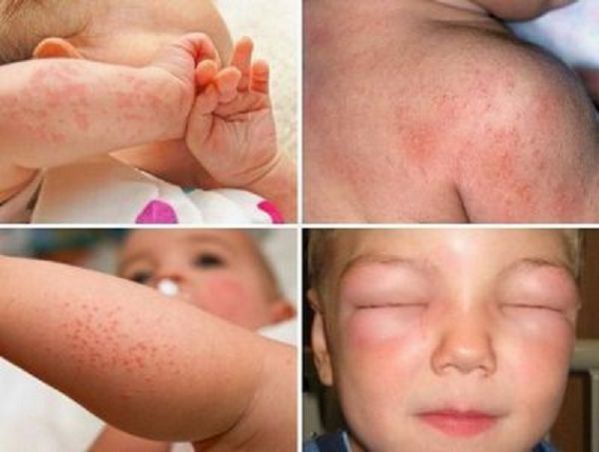
Treatment of adults and children
The therapeutic regimen is prescribed on an individual basis. The doctor must select medications that are good for a particular person. Antihistamines must be used to relieve symptoms. Suprastin, Loratadine, Tavegil help well. Medicines can reduce allergic manifestations within a few days.
To eliminate the rash, you can use Fenistil gel. It quickly relieves inflammation and prevents itching. Special drops are used for the eyes and nose to combat allergies. It is important to cleanse the body with the help of sorbents, as it is important to remove the allergen and toxic substances. You can use Polysorb, Smecta, activated carbon. Sorbents are used for 1-2 weeks, as it is important to completely cleanse the body.
It is recommended that you consult a doctor, as he will make an accurate diagnosis and select the appropriate treatment. It may be necessary to change the therapeutic regimen if the prescribed drugs do not help. In most cases, it is possible to get rid of allergies within a few days after starting therapy. Sometimes the process takes longer if the symptoms are severe.




